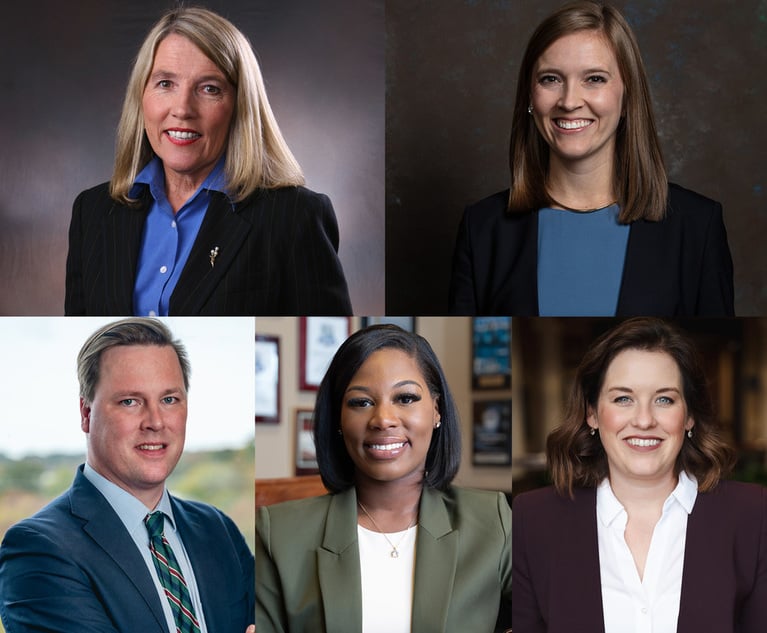Attorney-Client Privilege, the Cohen Raid and the Mueller Investigation
Is everything in a lawyer's office protected by attorney-client privilege? The answer is almost always “no.”
April 26, 2018 at 12:21 PM
6 minute read

Investigators from the U.S. Attorney's Office for the Southern District of New York recently seized materials from the offices of President Donald Trump's personal attorney Michael Cohen. The search and the Mueller investigation have put attorney-client privilege in the news like never before. Privilege is a central component of the attorney-client relationship, and yet it is frequently misunderstood. A review of the basics can clear up much popular confusion and help us understand what privilege might mean for recent events.
Is everything in a lawyer's office protected by attorney-client privilege? The answer is almost always “no.” Attorney-client privilege applies to:
- Communications;
- Made for the purpose of giving or receiving legal advice:
- Between an attorney and a client (and no one else):
- Made in circumstances offering a reasonable expectation of privacy; and
- The attorney and client must continue to maintain the confidentiality of the communication.
If any one of these elements is lacking, then privilege probably does not apply.
Many important principles of privilege jurisprudence can be adduced through application of these simple elements. Consider element No. 1: privilege protects communications. If Jane Client emails a contract to her attorney and asks for legal advice, then Jane's email is privileged, but the contract itself is still subject to discovery. The communication is protected, but an otherwise nonprivileged item does not acquire privilege by being attached to, or being the subject of, a privileged communication.
Or consider element No. 2: The communication must consist of legal advice or be made for the purpose of providing or receiving legal advice. Not all communications between an attorney and a client are privileged. For one thing, they must fall within the scope of the representation.
Similarly, element No. 3 requires the communicating parties to be attorney and client and no one else. If someone else is a party to a communication, then it probably is not privileged.
Element No. 4, reasonable expectation of privacy, is often overlooked. If you shout legal advice to your client while standing in a crowd, you may have waived privilege: shouting in a crowd offers no reasonable expectation of privacy. A subtler aspect involves email: If you represent a client in a personal matter and communicate through an email address provided by your client's employer, many courts will find a waiver of privilege, because employers often have the right to review all communications made or stored on their systems.
Element No. 5—maintaining confidentiality—means that privilege is waived if an attorney-client communication is shared with third parties.
One important principle not inherent in the elements of privilege is the “crime-fraud exception.” If legal advice is procured for the purpose of, or used in the commission of, a crime or fraud, then privilege may be waived. This exception can apply even if the attorney is unaware of the improper purpose or use.
In addition to attorney-client privilege, materials in an attorney's files may be protected as “attorney work product,” if they were prepared by the attorney in connection with actual or anticipated litigation. Work product protection is less absolute than privilege, but it can sometimes protect things that privilege does not.
What do these principles mean for materials seized from Michael Cohen's office or sought in the Mueller investigation? We cannot yet know all the answers, but some observations are possible.
The Stormy Daniels Settlement
Cohen told The New York Times that he negotiated a confidential settlement with Stormy Daniels, who has alleged she had an affair with Trump; Cohen said he used his personal funds to make the settlement payment.
According to various reports, materials relating to that settlement may have been a target of the search. Are Cohen's settlement files privileged? Remember element No. 1: privilege protects communications. Cohen and Trump have both said that the president was unaware of the settlement or the payment. If the president did not know about them, then it seems likely that he and Cohen did not communicate about them, and there would be no communications for privilege to protect.
On the other hand, if the two had discussed the dispute with Daniels sometime in the past, then privilege might protect those earlier communications, as well as materials reflecting those earlier communications. Work product protection might also apply to some settlement materials.
Some commentators have asserted, however, that a settlement made without a client's knowledge cannot fall within the scope of an attorney's representation. Materials outside the scope of a representation are not entitled to privilege or work product protection.
Finally, some have claimed that Cohen's payment may have violated campaign finance laws. If so, the crime-fraud exception could apply.
Sean Hannity
In a recent hearing, Cohen's attorneys discussed the need to protect privileged materials relating to clients other than the president. They reluctantly identified Sean Hannity as one such client. In response, Hannity stated that Cohen “never represented me in any legal matter,” then said in the same statement, “I requested attorney-client privilege with him.”
Of course, if Cohen “never represented” Hannity, then he was not Hannity's lawyer, and attorney-client privilege cannot attach to their communications. On the other hand, factual details Hannity offered in the same statement appear to confirm the representation, as do his subsequent statements.
A layperson cannot be expected to offer faultless legal analysis when responding to developing news. Hannity's statement is notable not because he was confused but rather because his confusion typifies widespread misunderstanding. Attorney-client privilege does not attach solely because an attorney is party to a communication or because materials are kept in a lawyer's office or because someone wishes it to apply. It simply allows open and honest communications between attorneys and their clients by protecting those communications from others.
It is still too soon to know what attorney-client privilege will mean for the Cohen raid or the Mueller investigation, but some basic knowledge can cut through much popular noise. Despite claims to the contrary, attorney-client privilege is alive and well. It simply is not as broad as many seem to think.
John M. Gross is a partner at Taylor English based in Atlanta where he focuses his practice on government and internal investigations. Gross has served as lead counsel in federal and state trial and appellate courts, in administrative proceedings and before alternative dispute resolution panels.
This content has been archived. It is available through our partners, LexisNexis® and Bloomberg Law.
To view this content, please continue to their sites.
Not a Lexis Subscriber?
Subscribe Now
Not a Bloomberg Law Subscriber?
Subscribe Now
NOT FOR REPRINT
© 2025 ALM Global, LLC, All Rights Reserved. Request academic re-use from www.copyright.com. All other uses, submit a request to [email protected]. For more information visit Asset & Logo Licensing.
You Might Like
View All

Plaintiffs Attorneys Awarded $113K on $1 Judgment in Noise Ordinance Dispute
4 minute read
'Didn't Notice Patient Wasn't Breathing': $13.7M Verdict Against Anesthesiologists
12 minute readTrending Stories
- 1Some Thoughts on What It Takes to Connect With Millennial Jurors
- 2Artificial Wisdom or Automated Folly? Practical Considerations for Arbitration Practitioners to Address the AI Conundrum
- 3The New Global M&A Kings All Have Something in Common
- 4Big Law Aims to Make DEI Less Divisive in Trump's Second Term
- 5Public Notices/Calendars
Who Got The Work
J. Brugh Lower of Gibbons has entered an appearance for industrial equipment supplier Devco Corporation in a pending trademark infringement lawsuit. The suit, accusing the defendant of selling knock-off Graco products, was filed Dec. 18 in New Jersey District Court by Rivkin Radler on behalf of Graco Inc. and Graco Minnesota. The case, assigned to U.S. District Judge Zahid N. Quraishi, is 3:24-cv-11294, Graco Inc. et al v. Devco Corporation.
Who Got The Work
Rebecca Maller-Stein and Kent A. Yalowitz of Arnold & Porter Kaye Scholer have entered their appearances for Hanaco Venture Capital and its executives, Lior Prosor and David Frankel, in a pending securities lawsuit. The action, filed on Dec. 24 in New York Southern District Court by Zell, Aron & Co. on behalf of Goldeneye Advisors, accuses the defendants of negligently and fraudulently managing the plaintiff's $1 million investment. The case, assigned to U.S. District Judge Vernon S. Broderick, is 1:24-cv-09918, Goldeneye Advisors, LLC v. Hanaco Venture Capital, Ltd. et al.
Who Got The Work
Attorneys from A&O Shearman has stepped in as defense counsel for Toronto-Dominion Bank and other defendants in a pending securities class action. The suit, filed Dec. 11 in New York Southern District Court by Bleichmar Fonti & Auld, accuses the defendants of concealing the bank's 'pervasive' deficiencies in regards to its compliance with the Bank Secrecy Act and the quality of its anti-money laundering controls. The case, assigned to U.S. District Judge Arun Subramanian, is 1:24-cv-09445, Gonzalez v. The Toronto-Dominion Bank et al.
Who Got The Work
Crown Castle International, a Pennsylvania company providing shared communications infrastructure, has turned to Luke D. Wolf of Gordon Rees Scully Mansukhani to fend off a pending breach-of-contract lawsuit. The court action, filed Nov. 25 in Michigan Eastern District Court by Hooper Hathaway PC on behalf of The Town Residences LLC, accuses Crown Castle of failing to transfer approximately $30,000 in utility payments from T-Mobile in breach of a roof-top lease and assignment agreement. The case, assigned to U.S. District Judge Susan K. Declercq, is 2:24-cv-13131, The Town Residences LLC v. T-Mobile US, Inc. et al.
Who Got The Work
Wilfred P. Coronato and Daniel M. Schwartz of McCarter & English have stepped in as defense counsel to Electrolux Home Products Inc. in a pending product liability lawsuit. The court action, filed Nov. 26 in New York Eastern District Court by Poulos Lopiccolo PC and Nagel Rice LLP on behalf of David Stern, alleges that the defendant's refrigerators’ drawers and shelving repeatedly break and fall apart within months after purchase. The case, assigned to U.S. District Judge Joan M. Azrack, is 2:24-cv-08204, Stern v. Electrolux Home Products, Inc.
Featured Firms
Law Offices of Gary Martin Hays & Associates, P.C.
(470) 294-1674
Law Offices of Mark E. Salomone
(857) 444-6468
Smith & Hassler
(713) 739-1250







